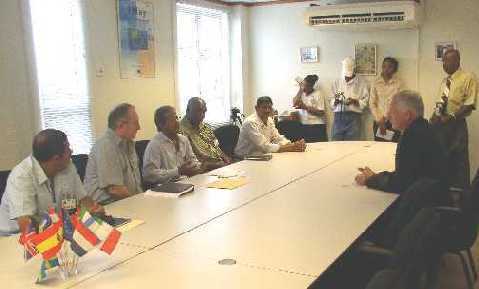Guyanese Unions Demand EU Withdraws Sugar Price-cut Proposal
Posted to the IUF website 06-Aug-2004Share this article.
�A threat to Sugar is a threat to Guyana,� read a placard at a union demonstration in front of the European Delegation in Georgetown last 19 July. Several dozens of workers with the IUF-affiliated unions GAWU and NAACIE, made their voice heard on the reforms to the European Union sugar regime proposed by the European Commission on 14 July.
The proposed reforms could lead to important changes to the EU sugar regime, including the ending of the intervention price system and cut to guaranteed prices, changes to the national production quota system, and income support to beet farmers, among others. Of high importance to the Africa, Caribbean and Pacific group of countries (ACPs), if the proposal is passed, is that cuts to domestic prices would result in the reduction of the EU/ACP preferential price by an estimated 37 percent in the next two years (see Sugar Worker June 2004 for more information).
Following the demonstration, on 27 July, the Guyanese unions and the state-owned Guyana Sugar Corporation (GuySuCo) delivered a letter to the European Delegation in Guyana, stating that their industry provides direct employment to 20,000 workers and 5,000 cane farmers, and creates close to 100,000 indirect jobs. The impact of a sudden and drastic cut in preferential prices would be devastating for a country with a total population of only 750,000 people: �Without sugar all in Guyana will suffer,� read another placard.

Across the table from Per Eklund, Head of the EU Delegation to Guyana, are GAWU president Komal Chand (centre), flanked by NAACIE president Kenneth Joseph (to his left) and GuySuCo chief executive Michael Boast
Price-cutting decisions by the EU would be a major setback for GuySuCo�s expansion program, explained the letter, which aims at increasing annual production from the current 340,000 tonnes to 450,000 tonnes and reduce costs by 40 percent (from US 19 cents/lb to US 12/lb) by 2007. With a EU preferential quota of 167,000 tonnes per year, �the timing and extent of this price-cut proposal poses an unassailable challenge to the industry�� said the Guyanese. They called the EU to withdraw the price-cut proposal.
The demonstration on 19 July in Georgetown is not the first time that the Guyanese have shown the world how important sugar is: in 2001, a World Bank study proposed the �downsizing� of the industry by closing operations in the Demerara region and concentrating in the Berbice region. The Guyanese answer was a close defense of their industry and a strong support to the expansion plans. The demonstration on 19 July also counted with the presence of senior management of GuySuCo, while the Foreign Trade Minister, Clement Rohee, was also there. The sugar industry of Guyana was broadly represented, giving substance to the message of another placard: �Guyana united against EU Proposal.�
The IUF fully supports the initiative of her Guyanese affiliates. The European Union and the international community cannot ignore Guyana�s efforts to build a future for their people, based on an industry that has witnessed many positive changes in recent years: after production plummeted to 130,000 tonnes in 1990, the industry recovered thanks to the strong participation of the unions, firm political support, and straight management. While European sugar policies require adjustments, the IUF believes that these cannot unfairly hit the weaker partners.
The European Commission has said it would open a dialogue with the ACPs on trade and development, and that the EU would support ACP industries to improve competitiveness or diversify, if the former is not feasible. It also said that the impact of reforms on the developing world cannot be �addressed simplistically or hastily�: Guyana�s sugar industry is an opportunity for the EU to be true to its word.
The Guyana Agricultural and General Workers Union (GAWU) represents close to 95 percent of the workers employed in sugar; the National Association of Agricultural, Commercial and Industrial Employees (NAACIE) organizes clerical employees in the sector.
